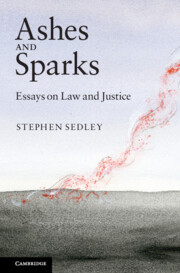Book contents
- Frontmatter
- Contents
- Preface
- Acknowledgements
- PART I History
- 1 Victors' justice
- 2 Above it all
- 3 Reading their rights
- 4 From victim to suspect
- 5 Farewell sovereignty
- 6 No law at all
- 7 The sound of silence
- 8 The spark in the ashes
- 9 Wringing out the fault
- 10 Everything and nothing
- 11 Skulls and crossbones
- PART II Law
- PART III Justice
- Index
10 - Everything and nothing
Published online by Cambridge University Press: 05 June 2012
- Frontmatter
- Contents
- Preface
- Acknowledgements
- PART I History
- 1 Victors' justice
- 2 Above it all
- 3 Reading their rights
- 4 From victim to suspect
- 5 Farewell sovereignty
- 6 No law at all
- 7 The sound of silence
- 8 The spark in the ashes
- 9 Wringing out the fault
- 10 Everything and nothing
- 11 Skulls and crossbones
- PART II Law
- PART III Justice
- Index
Summary
This occasional piece for the London Review of Books,published in October 2004, looked at the British constitution in motion.
In June last year the Lord Chancellor, Lord Irvine, was dismissed in a cabinet reshuffle. It was announced, not to Parliament but by press release, that his office was not to be filled and that his department was to become part of the Department for Constitutional Affairs, headed by a newly appointed minister, Lord Falconer. Of the expected Ministry of Justice there was no sign. The Home Office, it appeared, would not relinquish its hold on criminal justice. Then it was realised that there were scores of functions which by law only the Lord Chancellor could perform, and Lord Falconer, wearing a morning coat instead of the splendid black and gold robe, was sworn in as a nightwatchman Lord Chancellor. The joke went round Whitehall that the legislation enshrining the new dispensation was to consist of a single clause giving press releases from Number Ten the status of primary legislation.
Only then did public consultation begin. Papers on a new supreme court, the reform of judicial appointments, the future of the Queen's Counsel system and of the Lord Chancellor's office, came out so swiftly and in such polished form that the constitutional historian Robert Stevens has speculated that they must have been in preparation before the changes were announced.
- Type
- Chapter
- Information
- Ashes and SparksEssays On Law and Justice, pp. 122 - 130Publisher: Cambridge University PressPrint publication year: 2011



